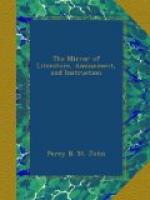Querno, willing to make up for his former deficiency, exclaimed—
Porrige, quod facient mihi carmina docta Falernum:
To aid my genius, and my wit refine,
Most Holy Pontiff, pour Falernian wine.
The Pope immediately replied—
Hoc vinum enervat debilitatque pedes:
I shall supply that wine with sparing
hand,
Which from the feet takes off the power
to stand.
J.G.B.
* * * * *
DOUBTING.
The mind that never doubts shall learn nothing; the mind that ever doubts shall never profit by learning. Our doubts only stir us up to seek truth; our resolution settles us in the truth we have found. There were no pleasure in resolution, if we had not been formerly troubled with doubts; there were nothing but discomfort and disquietness in doubts, if it were not for the hope of resolution. It is not good to let doubts dwell too long upon the heart; there may be good use of them as passengers, but dangerous as inmates.
HALL.
* * * * *
CURIOUS ANECDOTE OF A PICTURE.
In Windsor Castle is the celebrated painting representing “The Interview of Henry the Eighth with Francis the First,” between Guisnes and Ardres, near Calais, in the year 1520, on an open plain, since denominated Le Champ de Drap d’or. “After the execution of Charles the First,” says Britton, “the parliament appointed commissioners to dispose of his effects, and an agent from France began a treaty with them for this painting. Philip, Earl of Pembroke, an eminent admirer of the arts, who considered the picture as a valuable appendage to an English palace, resolved, if possible, to prevent the bargain being concluded, and went privately to the royal apartments, cut out the head of King Henry from the canvass, placed it in his pocket-book, and retired unnoticed. The agent, finding the picture so materially mutilated, declined to purchase; and it remained in its station till Cromwell, having obtained the supreme command, prevented any further disposal of the collection. On the Restoration, the then Earl of Pembroke delivered the dissevered fragment to Charles the Second, who ordered it to be reinserted in its place. By looking sideways at the picture in a proper light, the reparation becomes visible.”
P.T.W.
* * * * *
MEMORY.
It is reported of the Emperor Claudius, that he retained
in memory all
Homer, Sallust, Demosthenes, Avicen, and Aristotle’s
Metaphysics.
Tully and Seneca never heard any thing material but it was imprinted in their memory.
Scaliger said he learned Homer in twelve days, and all the Greek poets in four months.
Seneca, the philosopher, could repeat two thousand names in the exact order in which they were rehearsed to him.




